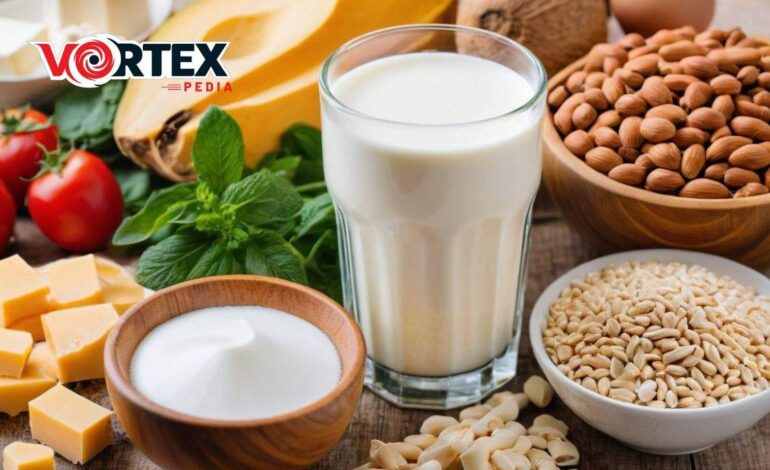
5 Foods That Have More Calcium than Milk (Get Stronger Bones)
Importance of Calcium in Your Diet
Why is calcium considered so important? What are the causes of calcium deficiency? How do we know that we are deficient in calcium? In this video, I am going to share with you 5 calcium-rich vegetarian foods that have more calcium than milk. Let’s dive into each of these crucial aspects.
Hello Friends! Welcome to Fit Tuber. There is no doubt that calcium is an extremely important mineral for your bones, teeth, heart, muscles, and nerves. Whenever calcium is deficient in the body, these organs will be affected. In fact, 99% of the body’s calcium is deposited in the bones and teeth. But when our body remains deficient in calcium for a long period, it begins to extract calcium from the bones and teeth. This can manifest in lower back pain, joint issues, and weakened bones susceptible to fractures and dental problems.
Symptoms of Calcium Deficiency
The role of calcium includes the keeping of bones and teeth strong and healthy while also participating in many other activities of the body. If the body fails to acquire enough calcium, it starts to manifest the consequences of deficiency of this compound. Here are some common symptoms:
- Muscle Cramps
The first symptom associated with calcium ingestion deficiency is cramp or spasm of muscles. Calcium is among the minerals that have the most critical functions in the body; majorly in muscle contraction and relaxation. Lack of potassium causes contraction of muscles and anyone experiencing low levels may have to endure soreness regularly in the legs or back.
- Numbness and Tingling
Calcium deficiency also impacts your nervous system in this way – you may feel as though your fingers and toes are going numb. This is regrettable because calcium is important for the proper functioning of nerves and therefore communication between the brain and the rest of the body.
- Weak and Brittle Nails
If you find your nails are growing not as strong and flexible as before, there could well be acute calcium aplenty. Calcium is essential in the maintenance of the strength and health of both your nails. Brittle nails may also be characterized by spots or ridges on the nail surface or the nail can be completely split.
- Fatigue and Weakness
Lack of energy or weakness is another sign of poor calcium intake could be another sign of calcium deficiency. Calcium is essential for energy production and muscle contractions; therefore, deficiencies are characterised by weakness and fatigue.
- Bone Pain and Osteoporosis
If the dropout rate of calcium is continued for many years, the patient can get worse and develop such conditions as pain in the bones and osteoporosis. Since the bones start losing the calcium in your body, they become weaker and the likelihood of fractures and osteoporosis are high.
- Skin Issues
Consequently, scientific literature of present day has associated calc ium paucity with several skin ailments particularly psoriasis and eczema. According to the study skin need calcium for its barrier function and specifically during the process of healing. If you don’t incorporate it into your diet, you may observe symptoms as dryness, inflammation, rashes and many more.
Causes of Calcium Deficiency
- Dietary Insufficiency
Lack of calcium containing foods and products are some of the main sources of calcium deficiency. It is a fact that even in the most popular diets, calcium intake can be quite low due to the lack of intake of dairy products or green leafy veggies. Milk is another important source of calcium, as are other dairy products such as cheese, yoghurt and other dairy products as well as calcium-fortified plant-based milks. If such foods are not consumed usually, then there will be lack of enough calcium in the body therefore the chances of deficiency will be high.
- Poor Absorption
Take calcium regularly but even in the event that you have taken the right amount the body does not easily absorb it. There is also a condition that influences the flow of nutrients such as calcium and this is malabsorption, especially in diseases like celiac disease or Crohn’s disease and poor-digestion. Also, the presence of some medications hinders the absorption of calcium by the body. For instance, certain antibiotics and drugs used to counter heart burn or osteoporosis can interfere with calcium in the body.
- Excessive Caffeine and Alcohol
Foods/Nutrition flammatory foods such as tea, coffee and alcohol affect calcium requirements negatively Other food and drinks H2: Tea or coffee or alcohol also leads to low calcium intake. Intake large cups of coffee reduce calcium levels in body through the urine hence limiting calcium consumption is advised. Likewise, on health, alcohol contains components that hinder the body from absorbing calcium, thus damaging bone status. Reducing intake of these substances is was helpful in retaining higher levels of calcium as well as the general body health.
- Lifestyle and Health Factors
Lifestyle factors and other comorbid conditions also increase the probability of people getting infected and/or succumbing to the diseases. Stress and lack of exercise may lead to problems with your bones and therefore regulating your calcium intake may pose a problem. This is because certain factors cause hormonal fluctuations that make the bones frail, especially in cases of menopause, thus increasing the risk of calcium deficiency. In order to have adequate calcium in the body, it is necessary to follow a proper diet, reduce stress and exercise.
The factors above, when well tackled, and by taking foods rich in calcium, a person can avoid the issues related to calcium deficiency, promote bone health, and general well-being.
5 Calcium-Rich Vegetarian Foods
Now, let’s explore five vegetarian foods that provide more calcium than milk:
- Choona: Derived from limestone, Choona is recommended in Ayurveda for its calcium content, especially when consumed with curd for better absorption.
- Sesame Seeds: With nearly 8 times more calcium than milk, sesame seeds also offer magnesium, manganese, and zinc, aiding in bone strength and joint health.
- Kulthi Dal: Known as horse gram, it is rich in calcium and also helps in preventing kidney and gallbladder stones.
- Ragi: This powerhouse grain contains 10 times more calcium than wheat and is rich in potassium and iron, making it beneficial for bone health and blood pressure regulation.
- Rajgira: Also known as Amaranth, it contains 340 mg of calcium per 100 grams and is gluten-free, offering a complete protein source along with iron.
Including these foods in your diet can effectively combat calcium deficiency and promote overall health. For more detailed recipes and tips on incorporating these foods, check the description box below.
By understanding these aspects and making simple dietary changes, you can ensure your body gets the calcium it needs for optimal health.








